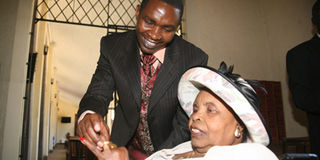Tribute to Wambui, a maverick freedom heroine

Former freedom fighter Wambui Otieno Mbugua and her husband Peter Mbugua during their wedding celebration at the St Andrew’s Church on February 4, 2011. Photo/HEZRON NJOROGE
It was the great progressive African nationalist Thomas Sankara who offered the words that perhaps best sum up the eventful life of Wambui Otieno-Mbugua: “You cannot carry out fundamental change without a certain amount of madness”.
The anti-imperialist Burkinabe president, sometimes referred to as Africa’s Che Guevara, said: “It comes through nonconformity, the courage to turn your back on the old formulas, the courage to invent the future.”
It seems an understatement to describe Wambui, who died last Tuesday, as a trailblazer.
A freedom fighter, a crusader for women’s rights, a pioneer who was not willing to be bound by the straitjacket of ethnic nationalism, Wambui shattered numerous glass ceilings that will allow generations of women after her to reach for heights they never before thought they could scale.
The glowing tributes in the social media and blogosphere captured Wambui’s role in not only shaping the legal and social discourse in both colonial and post-colonial Kenya but also internationally.
My introduction to Wambui came when I studied customary law for an accountancy course in the famous case of Wambui Otieno vs Umira Kager clan.
In that case Wambui went through an 18-month court battle with her late husband’s Umira Kager clan over the burial location.
The clan insisted that the prominent advocate Silvano Melea (SM) Otieno be buried in Siaya according to Luo customs and tradition and she contested this in court requesting that Otieno be buried in their Upper Matasia Home in Ngong according to his wishes.
Even though she lost the battle, this case was ground breaking for women who were treated as chattels when their husbands died and their opinions disregarded.
Because of Wambui’s audacity this case raised important issues on legal rights of women while also encouraging them to break their silence on inheritance among other rights.
But Wambui’s revolutionary history started earlier than that precedent-setting case.
Wambui was born Virginia Wambui Waiyaki in 1936 in a family that had a long history of anti-colonial resistance from her great grandfather Waiyaki wa Hinga, who was killed by the British in 1892.
In her autobiography Mau Mau’s Daughter: The Life History of Wambui Waiyaki Otieno, she exposed the complex family traditions she inherited of mixed ethnicity, resistance and later Christianity and how they shaped her.
In her typically nonconformist nature Wambui left home at 16 and joined the Mau Mau in Nairobi during the emergency period beginning her lifelong career as an activist.
True to her revolutionary self, she crossed class and gender divides to join the movement despite not being the typical Mau Mau recruit who joined due to socio-economic grievances since she came from a privileged Christian family.
Her father was the first African inspector of police. In the Mau Mau movement, Wambui served mainly as an intelligence agent by spying, scouting, liaising with the movement and helping with procurement of arms. She was later arrested and detained in Lamu.
As couriers
Her memoirs were the first narrative by a female participant to detail the roles played by women in the Mau Mau resistance – as couriers, intelligence gatherers and in weapon procurement.
Through her work Wambui exposed the critical role of women in the history of resistance in Kenya, who had largely been silenced by colonial and post-colonial historians joining other voices like Charity Waciuma, Tabitha Kanogo, Muthoni Likimani and Ann Presley.
Through this book Wambui left a legacy in academia by engendering the colonial resistance narrative which was largely male centred and exposing the history of women’s nationalism in Kenya.
Her legacy in politics in post-colonial Kenya is also significant.
In the early 1960s, she joined the Tom Mboya-led Nairobi People’s Convention Party (NPCP), as the leader of the Women’s Wing and later the Kenya Africa National Union (Kanu).
She was also involved in Kiama Kia Muingi (KKM), a Mau Mau successor organisation.
She ran for office as a Kanu candidate, served as an official in Maendelo ya Wanawake and the National Council of Women of Kenya where she partnered with women across the globe working on similar ideals of advancing women.
In 1985, frustrated by the manipulation of election and lack of internal party democracy, she left Kanu and later joined Jaramogi Oginga and other leaders in the Forum for Restoration of Democracy (Ford) to push for multiparty politics in Kenya.
In 1997, she unsuccessfully vied for the Kamukunji parliamentary seat on an NDP ticket and in 2007, she established the Kenya’s People’s Conventional Party on which she unsuccessfully contested Kajiado North seat.
Wambui was a trend setter who never shied away from controversy.
In 1961, despite opposition from her family, she married SM Otieno, a Luo, which was rare given the ethnic divisions supported by the pre- and post- independence leadership.
Most recently, in 2003, Wambui pushed the social boundaries further and generated a national debate after her marriage to her second husband, Peter Mbugua, 42 years her junior.
Her marriage generated debate mainly because she had threatened the patriarchal order that defines the Kenyan society, where a man, whatever his age, has the right to marry any woman regardless of age.
Wambui questioned why this privilege was unique to men and went ahead to solemnise her marriage in church.
Wambui’s life tensions, dilemmas and challenges are a true representative of the colonial and post-colonial Kenya and, when the nation’s history is finally written, Wambui Otieno-Mbugua will grace many chapters.
Through Wambui’s “madness” and courage to turn her back on the old formulas, she reinvented the future albeit in a small way as Sankara had advised.
Kenya has benefited legally, politically, academically and socially from the legacies she has left us. Because of her, we have come this far. Kenya will miss Wambui.
Njoki Wamai is a peace and security scholar at the African Leadership Centre (ALC) in King’s College, London.




